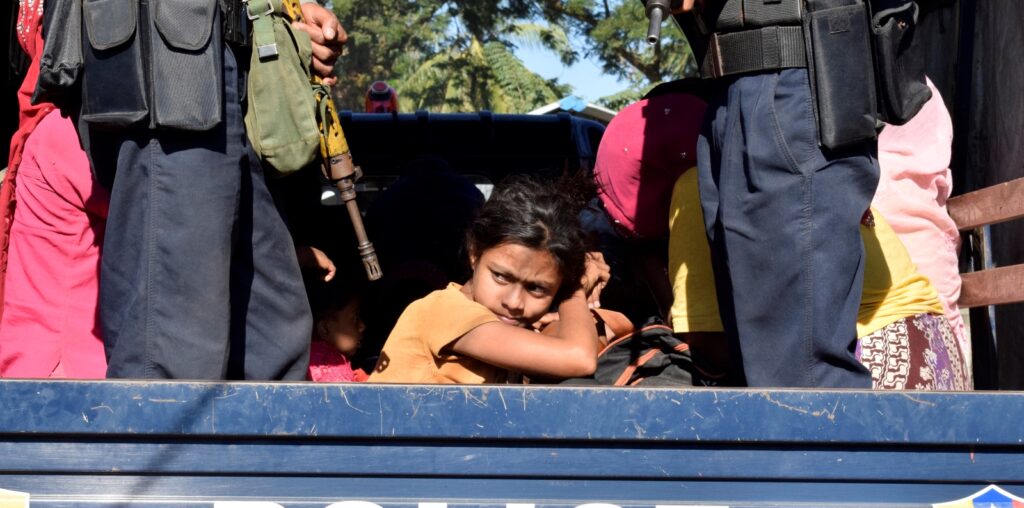OPINION
The Arakan Army is engaged in a just war in Myanmar’s Rakhine State, but it must be fought for all communities who call it home – including the Rohingya.
By EJAZ MIN KHANT
After being targeted by the Myanmar military in 2017, in a campaign that the United States and others have condemned as a genocide, the Rohingya are facing a new threat to their existence. For more than a year, amidst an upsurge in violence between the military junta and the Arakan Army, the predominantly Muslim ethnic group have increasingly become targets of the AA in their native Rakhine State.
Twan Mrat Naing, who commands the mostly ethnic Rakhine armed group, said in a recent interview that the United League of Arakan, the AA’s political wing, “has always focused on promoting social cohesion, inclusive governance, and equal and transparent treatment among various communities”. He added that the majority-Buddhist AA has “operated in many areas with large Muslim populations, and observers can see that our relations with the concerned Muslim community have been smooth”.
But interactions between the AA and Rohingya communities are, in reality, far from smooth.
Recent investigations by my organisation, Fortify Rights, and others have revealed patterns of abuse committed by the AA against Rohingya civilians, including indiscriminate attacks against fleeing Rohingya families on August 5 and 6 in northern Rakhine’s Maungdaw Township, which resulted in the death of more than 100 Rohingya civilians. Rather than investigating or explaining his soldiers’ actions, the AA’s commander has instead labelled accusations against him and his men as “unfounded and distorted”.
Worryingly, in a post on the X social media site early this year, Twan Mrat Naing also called Rohingya “Bengalis”. This word has been consistently used to present the Rohingya as foreign immigrants and infiltrators in Rakhine. For decades, Myanmar officials have refused to even use the term “Rohingya”, taking the position that they simply don’t exist as a Myanmar ethnic group – a status that has been used to deny them citizenship.
The AA commander’s use of discriminatory and divisive rhetoric was a shock to the Rohingya community. It gave them little hope for a better future under the rule of the AA, which has taken over most of Rakhine over the last year.
The AA’s increased hostility towards the Rohingya is, at least in part, driven by a new military dynamic. That is, that two major Rohingya armed groups, the Arakan Rohingya Salvation Army and the Rohingya Solidarity Organization, are supporting the junta’s fight against the AA and forcibly recruiting Rohingya youth for this purpose. But the military alliances of Rohingya militants cannot justify the collective punishment of the entire community, let alone the killing of civilians and other war crimes.
However, the AA has the ability to change course. Its fight against the brutal junta is a just and righteous one, but it must be fought for all communities in Rakhine, including the Rohingya.
To signal their intent to create a brighter future for Rakhine, the AA should firstly restore and protect the rights of the Rohingya as citizens native to Rakhine, and grant them greater political participation. The AA should avoid following former Myanmar governments and the current junta in erasing Rohingya identity and stripping them of their basic citizenship rights.
Secondly, the AA’s political wing should establish an independent investigative committee with the involvement of international experts to examine reports of alleged human rights violations by the AA against Rohingya, as well as against other ethnic groups in Rakhine and neighbouring southern Chin State. In addition, the ULA should appoint a Rohingya senior advisor to work in its administration. By doing so, they could earn the trust of the Rohingya community – a trust that is currently almost non-existent.
Lastly, as the AA gains control over even more territory in Rakhine, it should end the mass internment of more than 100,000 Rohingya in their villages and in camps created following communal riots in 2012. The ULA administration should also ensure Rohingya rights to freedom of movement and access to desperately needed humanitarian relief. Once these conditions are in place, the administration should assist the return of the more than 1 million Rohingya who have fled successive waves of violence to neighbouring Bangladesh.
Abandoning the discriminatory policies of the past and ensuring accountability are essential steps on the path to reform and reconciliation. They are also required for the AA to gain international recognition and legitimacy. Ultimately, stability, peace and prosperity in Rakhine require embracing diversity and recognising the benefits of an inclusive society – a society that is still within reach.
Ejaz Min Khant is a Human Rights Associate at human rights organisation Fortify Rights.

